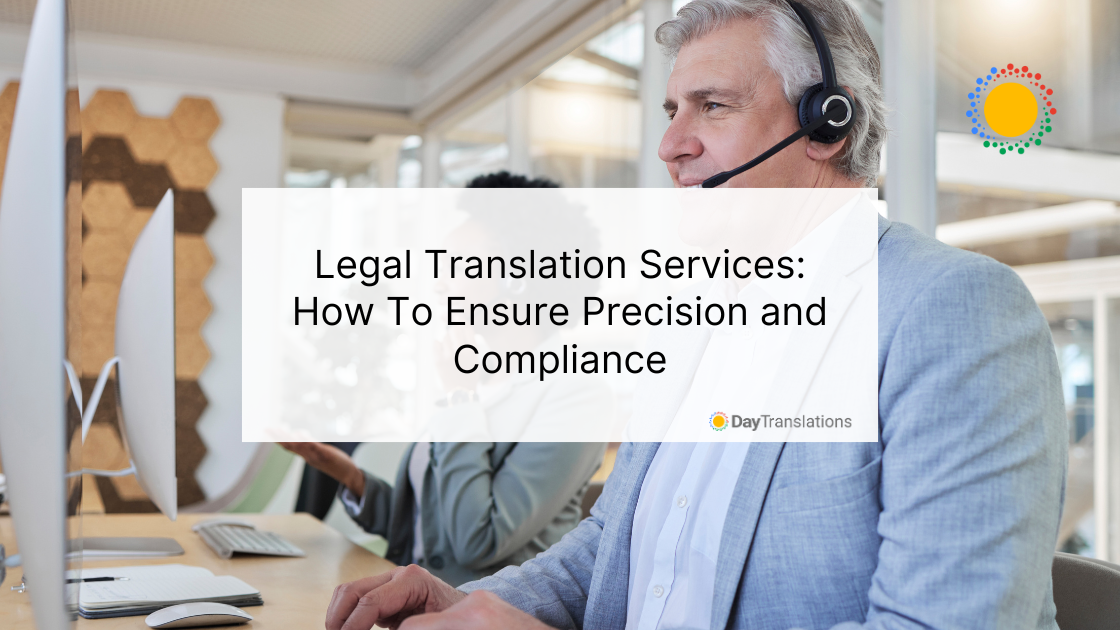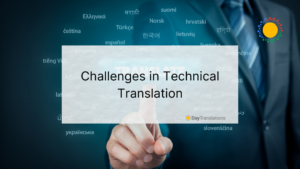Picture this: A business tycoon looks forward to expanding its global operations through offshoring. But when establishing an in-house center in another country, they should comply with the nation’s legal systems. So, they prepare all the required paperwork to submit for compliance. But when they have to draft legal content, they decide to hire legal translators to, yes, translate the documents. For the uninitiated, legal translation services turn legal documents into digital format. It usually involves translating legal content from one language to another.
However, legal documents are often complex. They require data accuracy, language precision, and lawful compliance. That’s where the challenges of translation services come in.
So, how do you ensure work precision and lawful compliance? Get some practical tips for your legal translation services.
Ready? Let’s dive right in!
Top Tips for Ensuring Accuracy and Adherence in Legal Translation Services
Translation services are a dime a dozen worldwide, from data entry to medical transcriptions to legal translations. In fact, the Data Bridge Market Research reported the following:
The global translation service market has a 17.45% compound annual growth rate (CAGR), potentially hitting $973.86 million by 2028 during the forecasted period.
The legal sector is among the industries that hire translation services for remote jobs. Clients usually employ translation service agencies or direct translators. They are hired to attend to the following legal content:
- Contract Agreements: They define the terms and conditions of two parties.
- Court Documents: These include pleadings, judgments and orders, subpoenas, warrants, affidavits, and legal briefs.
- Wills and Testaments: They grant the individual’s wishes, like the distribution of property, assets, and wealth, upon their death.
- Immigration Paperwork: They cover legal details for moving from one country to another.
- Corporate Documents: They include articles of incorporation, corporate bylaws, stockholder’s agreements, employment contracts, and more.
- Legal Correspondence: They encompass all communication paperwork, from letters of engagement to cease and desist letters to demand letters.
But as a translation service agency or translator, you should understand the psychology of translation. For one, ensure the accuracy of the information being translated. Likewise, comply with the existing laws and regulations governing the legal industry and translation market.
So, how do you maintain document precision and lawful compliance for your legal translation services? Here’s how:
1. Study the Legal System
As a translation provider, you should first understand the legal system in your country of operation.
If you’re operating across the globe, it’s all the more necessary to familiarize yourself with the laws and regulations of each country you serve. Take note of the following:
- Laws: You don’t have to get into the specific legal details, but you should know the country’s constitution in general. Suppose you’re working with a holding company under a living trust for business protection. In that case, you should know how a trust-owned LLC works. That way, you won’t have difficulty translating your client’s legal documents.
- Regulations: You should also study the regulations in your country of operations, whether federal, state, or local. Offering translation services will be much easier if you understand the legal terminologies and cultural nuances. That way, your clients will be surely delighted with your services.
2. Get the Right Translators
The success of your legal translation services depends on your team of translators. These employees are at the core of your operations, ensuring top-notch translation and client satisfaction.
What better way to do this than to hire suitable translators for your agency? Here are some of the attributes to look for:
- Legal Backgrounds: Since you’re catering to the legal sector, hiring those with legal backgrounds makes sense. They don’t necessarily have to be licensed attorneys or paralegal assistants. However, they must have taken law-related subjects or undergone legal training.
- Translation Experiences: Jesse Galanis, Content Marketer at Furm suggests, it would be best to employ those with experience working in law firms or other legal institutions. They can be administrative assistants or paralegal personnel exposed to legal work. Such experiences will make it easier for them to translate legal content pieces.
- Cultural Sensitivity: If your agency operates worldwide, consider employing those who have cultural knowledge and understanding. That way, they won’t find it hard to decipher legal nuances in documents. If possible, offer proper orientation and training before the actual translation work.
3. Set Translation Processes
Linda Shaffer, Chief People Operations Officer at Checkr, recommends establishing SOPs for legal translation services.
Shaffer said,“As with any industry, setting SOPs in place is imperative. This essentially applies to legal translation services since legal matters are quite complex and sensitive. As you may be aware, there’s no room for errors for such services.”
That said, Shaffer suggests the following steps:
- Standard Workflows: Create a roadmap for translators, from obtaining documents to translating content to submitting paperwork to clients. Consider critical metrics like process efficiency, data accuracy, and output productivity. Standards help streamline your translation processes and guarantee workplace success!
- Work Policies: Implement standard guidelines and protocols for translators to follow when doing their work. Consider key policies, such as confidentiality, data privacy, and intellectual property (IP) rights. More importantly, your employees should strictly observe and follow these set policies.
4. Hold Proper Training
The future of translation services looks bright and promising, as shown by the statistics above. However, keep up with the trends and innovations in the translation market.
Providing proper training and regular updates is key to achieving this goal. That said, here’s what you need to consider:
- Legal Orientation: Educate your translators about basic laws and regulations before they hit production. Doing so can help make their translation work a lot easier and faster. Likewise, regularly provide them with vital updates since legal matters are ever-changing. You must stay abreast and comply!
- Translation Training: Train your newly hired translators before they start doing translation work. They should acquire the legal knowledge and translation skills to do the job. Constantly offer training programs so these employees will be adept at their work.
5. Have Quality Assurance
Quality assurance in translation translates to work quality and overall success. Establishing a solid QA team is best to ensure translation precision and business compliance.
Wondering what the QA team does? Here’s what they are responsible for:
- Work Audit: The team has the last touch on the translated documents. While at it, they check for data accuracy, quality translation, and policy adherence. The goal is to achieve 100% error-free documents before you submit them to clients.
- Compliance Check: The team is also responsible for checking employees’ adherence to internal policies and external regulations. They monitor translators, make real-time corrections, provide one-on-one coaching, and offer personal improvement plans (PIPs). It doesn’t make sense for legal services to face legal consequences themselves after all!
6. Build Legal Resources
Michael Power, CMO at DTF Transfers, suggests building resources for legal translation services.
Power said, “You should have all the required resources your staff needs to do their job. This idea makes sense since you are dealing with legal paperwork that needs accurate translations. Therefore, you should invest in information, tools, and resources little by little.”
That said, Power recommends the following resources:
- Legal Dictionary and Glossary: Set your own legal dictionary and glossary in place. That way, translators can easily and quickly refer to them when needed. But as much as possible, these resources should be comprehensive and detailed for the translators’ benefit.
- Knowledge Base Center: Build your knowledge base center to store legal information, workflows, and policies. Only authorized personnel and translators should have access to this. The goal is to have a unified platform where employees can get what they need to become successful in their work.
7. Use Digital Tools and Technology
Industries not utilizing the latest digital tools and advanced technologies might get left behind. And this idea applies to the legal translation market.
As a service agency, consider investing in technological resources to improve your operations. Consider the following:
- Digital Tools: For one, tap into artificial intelligence (AI) and machine learning (ML) for data analytics and business forecasting. You can also use automation to minimize manual work and accelerate the tasks of your translators. Lastly, invest in technology that can do the translation itself.
- Communications Technologies: Sure, you can go as far as leveraging human-aided machine translation. However, your team of translators should use tools for interacting with various stakeholders, especially with clients. Remember, communication is key to effective collaboration and business success.
8. Work with Clients
Jesse Hanson, Content Manager at Online Solitaire & World of Card Games, emphasized the need to work closely with clients.
Hanson said, “They are your customers seeking legal translation services to ensure accuracy and adherence. You should know what they need and what their requirements are. More importantly, do what it takes to meet these needs and comply with the requirements.”
As such, Hanson recommends the following practices:
- Clear Communication: It’s no secret how communication is almost always the key to success. Ensure your translators work closely with their assigned clients to translate legal documents. Understand their requirements, ask for clarifications, and maintain regular interactions when working.
- Regular Collaboration: As a translator, you’re responsible for translating legal content, formatting documents, and preparing them for clients. However, the legal needs and requirements must come from the clients themselves. Therefore, constant collaboration is required for effective translation.
Staying on Top of Your Legal Translation Services
Legal translation services are a bit complex given the scope and nature of work. For all we know, it requires data accuracy, language precision, and full compliance. That’s why you should stay on top of all these as a translation service agency.
That said, heed our practical advice for ensuring precision and compliance. Start with studying the legal system thoroughly and end by working with clients closely. But somewhere in between, consider the following:
- Hiring suitable translators,
- Setting translation SOPs
- Holding legal orientation and skills training
- Establishing a QA team
- Investing in legal resources
You should have no room for errors and shortcomings when offering translation services. Ultimately, staying on top of what you offer is key to business success!
Author Bio
Catherine Schwartz
HARO & Content Outreach
[email protected]
+1(415)988-5842












Sorry, the comment form is closed at this time.